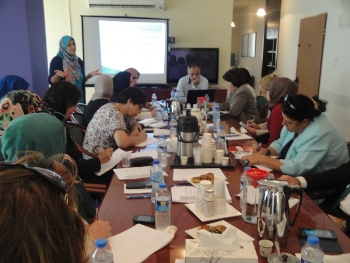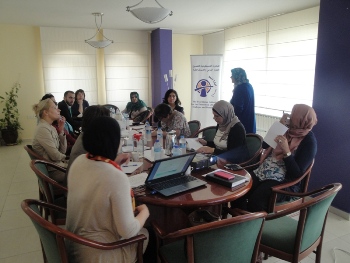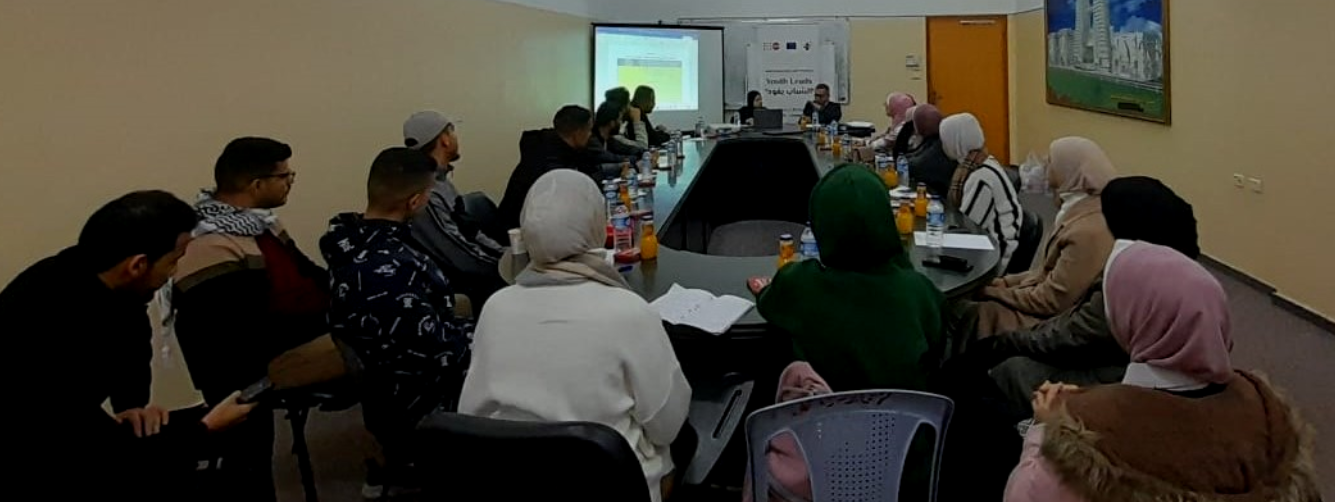
Ramallah – As part of its program “Institutionalizing UN Resolution 1325 to achieve peace and security for Palestinian women”, which MIFTAH implements with support from OXFAM, a meeting was held to discuss a report on violations against Palestinian women in the West Bank. The report was based on conclusions from the campaign for documenting violations against women and girls which MIFTAH conducted in 2014 in the West Bank. This campaign included girls and women living in close proximity to the separation wall and settlements, women prisoners, Jerusalem residents and those living in the Jordan Valley.
Introduction
The report showcased two levels of conclusions: quantitatively, Mr. Ashraf Hamdan highlighted the scope and forms of violations against women in light of what is called the “collective occupation”; the other level of conclusions was qualitative, presented by Fida’ Barghouti, who shed light on what women do in their familial and local environments. She portrayed the occupation and social violence women are subjected to, whether those living next to the wall, women in Jerusalem, those near military checkpoints or residents of the Jordan Valley. These women showed tremendous ability to remain steadfast and adapt. They play the role of mothers, wives and breadwinners, all in order to preserve their families' structure and rights.
The qualitative results showed that women were subjected to various forms of violence by the Israeli army at checkpoints while moving to and from the West Bank during a twelve-months period in 2014. Furthermore, former female prisoners and Jerusalemite women faced at least one form of violence at checkpoints -- 72.1% and 63.3% respectively. Women who live close to settlements and to the separation wall and those living in the Jordan Valley were subjected to Israeli army and settler violence at 71.2%, 49.2% and 30.7% respectively. While Jordan Valley women were less exposed to direct violence from the army and settlers than women in other areas, they were subjected to violations such as land and crop confiscation and prevention of shepherding. They were not able to access educational services and water or housing services in the Jordan Valley by 63.8% and 69.6% respectively.
Jerusalemite women: exclusivity of violations
The report highlighted the exclusivity of the violations women in Jerusalem face. It showed that 71.2% of women in the city have been subjected to various form of violence from occupation forces or settlers, including 89.8% who were deprived of a number of educational and health services; 45.6% were deprived of housing and work while 12.2% were deprived of a Jerusalem ID card or magnetic card or were threatened with ID revocation. Furthermore, 87.3% had either money or cars impounded or had to pay fines and taxes while 14.6% were barred from travel abroad or from leaving Jerusalem.
Women who live near the settlements
The results showed that 91.5% of the women who live near settlements who were subjected to settler or Israeli army violence had experienced teargas inhalation, stun grenades and gunfire. 85.2% said they had been cursed and humiliated and 79.9% were prevented from accessing health care services and water. 5.4% said their land or crops had been stolen in the past 12 months; 27.4% of the women said the Israeli army attacked women the most near the settlements, followed by 26.2% who said the settlers. 36.6% said the army, settlers, police, border guards and intelligence officers all participated in attacks on women in these areas. Additionally, 4.9% said passing-through Israeli troops also participated in attacks on women.
Former prisoners
The report highlighted the violations against women prisoners during their incarceration. Results showed that the majority of prisoners had been beaten while being arrested from their home or at checkpoints by Israeli occupation soldiers, and that 88.5% had been insulted and cursed. 78.8% said they were barred from brining medicine or personal belongings with them.
Women living near the wall
The report results showed that 22.3% of women living near the wall said they had been subjected to the violence of occupation forces and settlers. 38.4% said they had been insulted and cursed, and 30.5% said they were prevented from obtaining permits to pass through the gates and that their homes had been raided by the army more than once. 8.5% said they were not allowed to move freely .
Direct proportionality between the occupation and violence inside the family
According to Fida Barghouti, the qualitative results of the quantitative research, showed a proportional relationship between the violence from the Israeli occupation against a family member, and violence against women in the family. In the case of Jerusalem women, 44.1% said someone in their family (husband or other family member) had been attacked by occupation forces or settlers. Furthermore 62.1% said they were subjected to one form of violence from a male family member – 72.7% to physical violence to 90.2% to psychological violence. A similar result was seen in women living near settlements who testified that more than one-third of their family members had been attacked by occupation forces or settlers. These attacks had repercussions on their subjection to violence within the family, with 52.3% saying they were physically abused and 77.1% psychologically abused by a husband of another family member.
Noteworthy findings
The rate of violence against women drops proportionally with the rate of attacks on one of their family members, a finding which confirms the direct proportionality between attacks on men in the family and familial violence against women in that same family. In the case of women who live near the wall who noted a lower percentage of attacks by occupation forces at around one-fourth, they also noted a lower rate of familial violence – 22.3% reported physical violence and 43.8% psychological violence by a family member. Furthermore, women living near settlements said 20.9% of their family members had been subjected to attacks by Israeli occupation forces or settlers, which was reflected on the drop in violence inside their own families, where 28.1% said they were subjected to physical violence while 28,1% to psychological violence.
Compounded suffering
Barghouti adds: “The report concluded that the scope of violations and suffering endured by women in the selected locations makes them more vulnerable to the elements of the conflict given that they are doubly affected in comparison to other societal sectors. This, in turn places responsibilities and repercussions on women, whose job is to provide safety and security for their families. Add to this the specific circumstances of the women’s families. The study showed that most of them are under economic and social pressures such as: an increase in the responsibilities of the husband and work pressure; family members who suffer from health problems, which call for hospitalization; an increase in caregiving for family members and parents given that most of the women were previously married except for 45.9% of former women prisoners who have never been married. There is also the angry responses from the male members of the family whenever they were subjected to violence.
Taking into consideration the demographic specifics, we can see that the majority of women in the various locations have below-secondary education levels; moreover, most of them do not work, factors which make them more vulnerable to poverty, unemployment and marginalization. In turn, this increases household burdens and reproductive roles on the women for the sake of the family’s continuation and living security given the poor political and economic situation.
The survey results showed that the most prominent obstacle women are subjected to is the occupation. It constitutes a threat to human security in general and women’s security in particular, thus increasing the burden of their duties. Add to this, the obstacle of being subjected to one or all forms of psychological and physical violence, coupled with poor education, a lack of work opportunities and resources and the economic and social circumstances around them. None of this, however, can ever undermine the roles women play in protecting their families.
Benefiting from the research results
MIFTAH project manager Najwa Yaghi began the session by giving a presentation on the nature of OXFAM-funded project “Towards Institutionalizing Resolution 1325 to achieve peace and security for Palestinian women.” She explained that the first draft of the questionnaires were developed by MIFTAH in partnership with UNFPA, saying that, “This time, through OXFAM's project, we were able to turn one questionnaire into five questionnaires concerning Jerusalem women, women prisoners, and women living near the wall, the settlements and the wall”. She said this is a participatory effort with the Higher National Committee for Implementing UNSC Resolution 1325, with members of the National Coalition for Implementing the Resolution in Palestine and with experts in human rights, peace and security.
Yaghi continued that the groups who developed the questionnaires included sections on violations that would criminalize the Israeli occupation for violations of Human Rights Law and International Humanitarian Law. When the questionnaires had been finalized, MIFTAH organized a campaign to document violations against Palestinian women all over the West Bank. Yaghi noted that MIFTAH added the group of questions linking familial violence with the violence of the occupation, which later led to the conclusion that the more there is oppression from the occupation, the more familial violence increased.
Yaghi urged the National Coalition, headed by the General Union of Palestinian Women (GUPW), and the National Committee for Implementing UNSC Resolution 1325, headed by the Ministry of Women’s Affairs, to benefit from the study and its findings when drawing up implementation plans for a national strategy to implement 1325. She also urged GUPW, as head of the National cCoalition, to begin the process of documenting violations.










